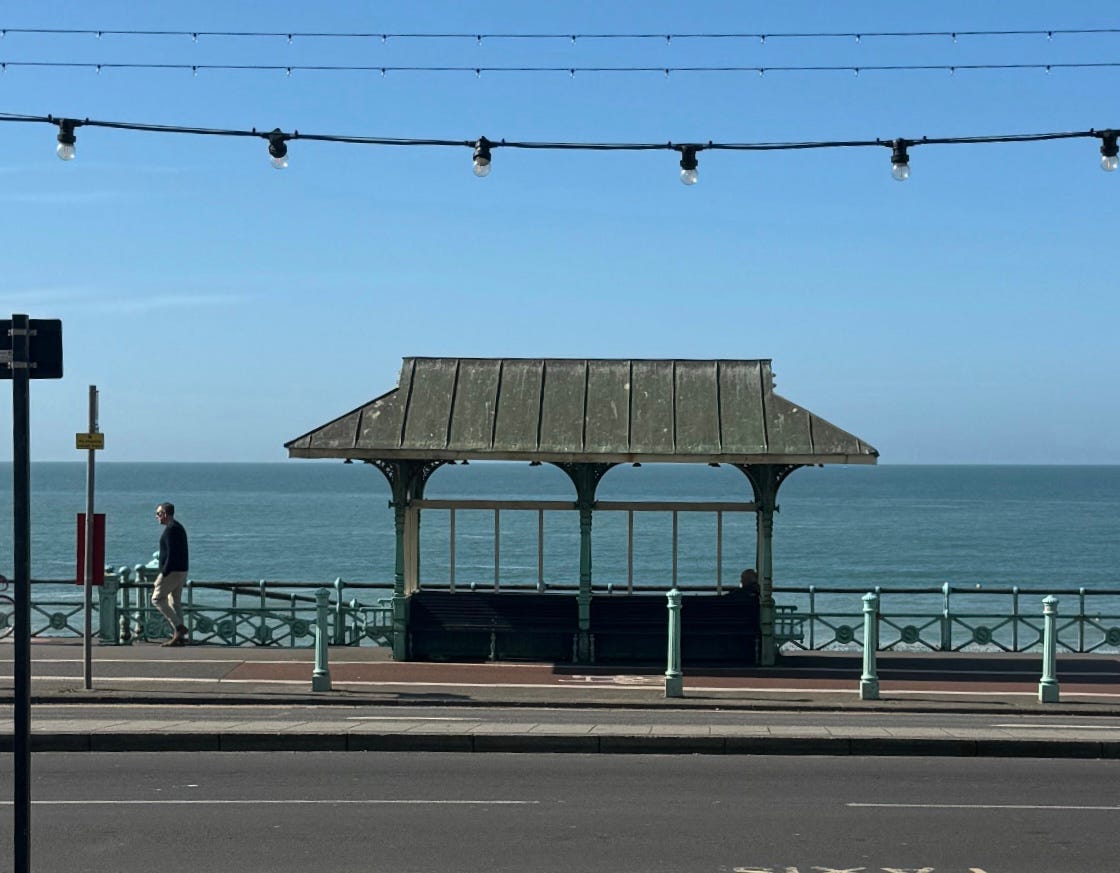Hello,
It’s Katherine May here - I usually write on The Clearing. But Elissa is feeling unwell this week, and so I’ve stepped in to give her one less thing to worry about. I know you’ll join me in wishing her a speedy recovery and lots of rest. She’ll be back soon.
In the meantime…
I had just got off my train at London Victoria station on Tuesday when my phone rang. I must admit that I do not usually answer my phone, but this one was from my son’s school. I sighed, and took the call. The school nurse said that she had my son in the medical room, and she really thought he ought to go home. I said Oh of course, of course, wondering if I could detect a note of accusation in her voice. I had, after all, insisted he went in this morning, assuring him he’d feel better once he got there. Apparently - as with so many things - I was wrong.
I was already feeling guilty about going, but now I felt wretched. Back home, my mother was trying to work out if she should fly back to Spain, where she’s lived for 15 years, because her partner had fallen dramatically ill. Given the direction that her own health has taken over the past few years, I was wondering if I should go with her.
But then there is that other source of guilt, my work, and how it so often pulls me away from home. Home, meanwhile, holds me ever closer. Most of the time, I feel trapped in an omnidirectional web of caring and work with no end in sight, only punctuated by a yearning for all the things I cannot do. It would feel like I’m doing it wrong, except that every other middle-aged woman I know is enduring the same thing, in one way or another. This is what we do.
The Tuesday guilt was only enhanced by the fact that I was adding a sneaky extra day to this work trip to spend with a friend. It’s been a long time since either of us have been able to get together, and I wanted to seize a rare opportunity for us both to have, well, fun. No agenda, no reason, no surrounding family; just us, being us for a while. I wondered whether she would cancel last minute, as so often happens with us, because something always comes up. But, on Tuesday morning, she had assured me that she was coming over to see me, come hell or high water. I messaged my husband from London. ‘Don’t worry about it,’ he said. ‘I’ll look after everyone. Just go.’
Of course, I promptly came down with a chest infection. It landed while I was on-stage that night, as I tried (and failed) to conceal fits of coughing while my host elegantly filled in. In the past few years, since my very first bout of covid, every cold turns into an infection. As I sat in the taxi back to my hotel room, I felt desolate. I would surely have to cancel now. I cursed my faithless immune system and my feeble lungs, my body’s inability to keep the promises I was so pleased to have made.
The next morning, I resisted the urge to get straight back on the train and called my doctor’s surgery instead. I didn’t expect anyone to be able to help from a distance, but I thought I could at least ask. My GP called back within 15 minutes, listened to my complaints and said that they felt sure I’d be able to diagnose my own chest infection by now. ‘What hotel are you staying at?’ she asked. I told her. ‘Okay,’ she said, ‘I’ve sent a prescription for antibiotics to your nearest pharmacy. Please take it easy, yes?’
I have a long and chequered history of not being believed by doctors, but there’s one advantage to being my age, and overstretched, and tired: I’ve stopped worrying what people think of me. Finally - finally - I’ve learned to ask for what I need, plainly and directly. It worked. By 9am, I was first in the line at Boots, waiting for my prescription to be issued. I took it easy all day because my whole being was pointed towards that one, blissful evening with my good, old friend. By the time she arrived, I was three doses into my course of antibiotics, and feeling a lot more human again.
‘You sound like a Victorian consumptive,’ she said as she came through the door. I’d booked us a suite in a budget hotel, which was clearly designed for stag-night parties. It had a fake buffalo head butting out of the wall, bean bags instead of a sofa, and six single beds, all lined up. The floor was so filthy that it turned the soles of my feet black, and it was in a basement with a single skylight at the far end of the room. We loved it. For about 12 hours, it was our cave. We ate Korean food and complained about our knees when we had to crouch down to get onto the beanbags.
We became friends at university, both of us from working-class families and tough, industrial towns, both of us from Kent, too. Meeting each other in the dorm corridor on the first day, we couldn’t believe our luck. We started shouting at each other in sheer delight, our Estuary accents flowing together, chiming and clashing in a glorious cacophony. Nobody else could understand us, and nobody could get a word in edgeways. That didn’t matter in the slightest to us. We’ve been yelling at each other ever since, through good times and bad. It’s just that, these days, the gaps between those yellings get longer and longer.
I used to think that our lives were on hold for now, and that we just have to wait it out until our children are grown and it all slows down. Then everything would be better again. Now I’m not so sure. Despite all the stress and the chaos, the inability to plan anything and the suspicion, sometimes, that I’ve lost my entire sense of self amid the rush, I no longer see this phase as a diversion from the life I wanted. This is the life; this is the beating heart of it all. My life was never something that I got to plan or control. That was just a misapprehension I carried through my twenties. I’ve let go of it now, along with many other childish things.
What did we talk about that evening? In no particular order: our children, our husbands, our mothers, our fathers; work, money, houses, plans; dogs, quite a lot; male academics who have annoyed or wronged us (a common theme); the parts of us we now suspect are arthritic; whether I’ve had that cough looked at. We went out to see a lecture about folklore, and roundly disapproved of it, and spent a good couple of hours yelling about why we were right and the lecturer was wrong. We went to what looked like a nice little pub, only to realise that it was loud like a nightclub. We talked about the way that all pubs are like nightclubs now, and wondered why everything has to be so loud. We laughed at how old we sound, and remembered that we were just like this at university, too. We got to bed past 1am, and caught about five hours’ sleep each, and had no regrets. We went happily off on different trains home.
It’ll be years before we can do that again, and the time will fly past, and we will wonder why we don’t do it more often. All sorts of things will happen, and we will learn about them only in Whatsapp messages and passing comments. We will sometimes feel lonely and will think of calling each other, but will decide, on balance, that we’re probably fine. We will sometimes resent each other for how hard it is to get together. But - and I have faith in this - at some point in the future, we will book another hotel room (and I won’t scrimp this time, I promise) and sit up late into the night yelling at each other again. Because that is the life that we have, and the one we always wanted.
Take care everyone, and maybe send a message to your oldest, most beloved friends this weekend. My dear friend Elissa will be back very soon.
Katherine







Katherine, this past September I had a weekend reunion with my two roommates from college. It was only the second time since we graduated 45 years ago this month that we were together. And we had a blast! It’s so important to keep these relationships going, even if it gives you some guilt.
Elissa, rest up and give yourself time to heal. You are missed but the priority is you getting well.
Get well soon, both yourself and Elissa! Rest and recover. Thanks for this beautiful piece of writing, lovely reflection on connection to others and ourselves x